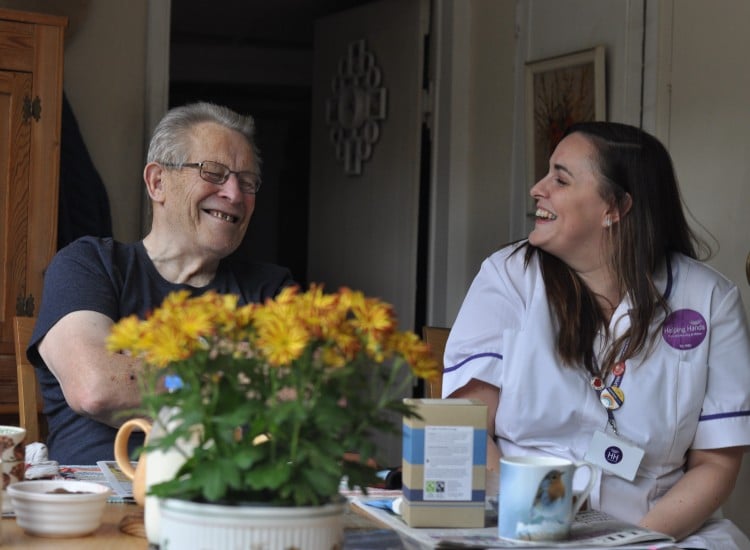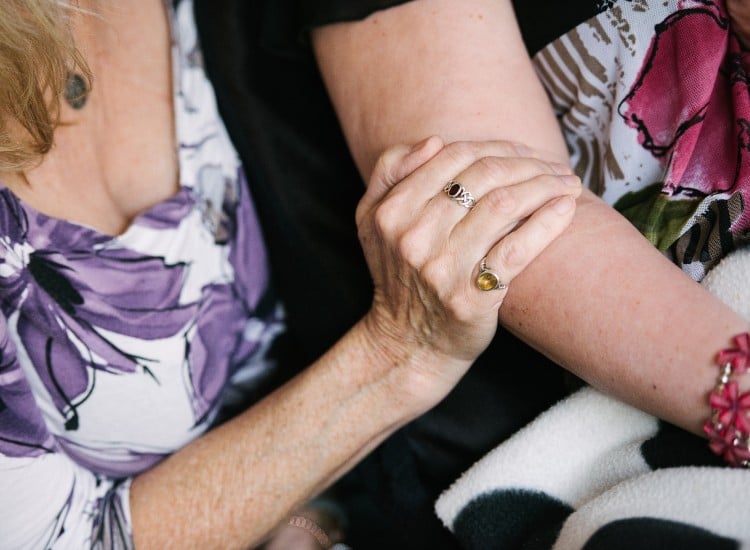There’s no question that modern life can be busy; the pressures of work and family often mean that our feet barely seem to touch the ground as we dash from one location to another. We frequently have to cram as much as we possibly can into every day, and once we finally get home, we only have the energy to drop into a chair and put our feet up. We have good intentions; often wondering how elderly neighbours or friends may be getting on, but we don’t always give ourselves enough time for a proper visit. Instead, we find ourselves throwing a quick ‘how are you?’ into the air as we wave at elderly neighbours through a window, mentally reminding ourselves to stop by soon to check on them properly.
Well perhaps this year, we should do things slightly differently by making an extra effort to give our elderly neighbours the gift of time. Our time.
Why we should show companionship towards our neighbours
At Helping Hands, we pride ourselves on our compassionate, empathetic care towards all our customers, but there are plenty of older people in our society who don’t require formalised live-in care, so who should be keeping an eye on them? The answer is every one of us. While there are plenty of older people who manage practical, day-to-day life at home very well, that doesn’t mean they never get lonely and wouldn’t welcome a phone call or visit from time to time, this would be made much easier with a mobile phone for elderly people . Maybe they’d appreciate a friendly check-in to see how they’re doing, or a catch-up over a cup of tea or two, especially in the current climate. Now that we have weathered lockdowns and many of us are able to go out and about again, we should still be sparing a thought for those who may be reluctant or unable to leave their homes. Organisations quickly mobilised, and volunteers were utilised all over the country to ensure that older and vulnerable people self-isolating in the community were taken care of. Apps were produced that could put vulnerable people in touch with a registered volunteer, and supermarkets kept back delivery slots so that those who were self-isolating could receive essential supplies. However, as time went on and the lockdowns lifted, those of us who were mobile were able to start taking part in (albeit a reduced) society again. While many were able to return to work and start seeing family and friends, there were a lot of older people who hadn’t the confidence to go outside, or due to unclear advice regarding the dangers posed by COVID-19, didn’t want to risk interacting with others, either inside or outside of their homes. These are the people who remain at risk from loneliness, and as the nights have drawn in and the hours of darkness lengthened, they are likely to have even fewer opportunities to see people.

The year of 2020 was such a strange time for everyone and probably the most isolated year in living memory, so perhaps we can instead embrace this and turn it into a positive? When talking to family and friends we should be starting a conversation on how we can all do our part to ensure that the more vulnerable and isolated in our communities are not forgotten this winter. There are many organisations who work tirelessly to ensure that those at risk of loneliness and social isolation are supported, pairing them with a volunteer who then visits them at home or takes them out locally, and most are bound to be eagerly recruiting volunteers in every area of the country during the pandemic. Reputable organisations, such as Age UK will ensure that the volunteers are thoroughly vetted and background checked via the government’s Disclosure and Barring Service (DBS), to safeguard the wellbeing of the most vulnerable members of society.
What can I do to support elderly people in my area?
It’s really important that we don’t presume that every person living alone is lonely and try to force them to engage socially with those around them. Some people may prefer a more isolated way of life and it would be wrong for us to presume that just because someone lives alone, they would welcome hordes of well-meaning callers. However, if you’re checking in on a neighbour, the chances are you already know their preferences and whether they would welcome a visitor or not. We also have to be mindful of whether someone is self-isolating in the current situation. If the person is able to have some company though, what else could we do to be useful to them?
Care packages
Care packages are a lovely way to put together essentials that someone may need but are unable to resource themselves, perhaps due to being unable to leave the house. There are also older people who may not feel comfortable ordering from the internet or may not have the resources to do so, which means that a care package left on the doorstep for someone isolating would be a lovely touch. Additionally, why not put a note through a neighbour’s door asking if they need anything from the supermarket? If your isolated relative is further away you can still make them feel special, as there are companies online who specialise in elderly home care and care packages that are designed for letterbox delivery.
Run errands
Supermarket essentials won’t be the only thing that older people may struggle to access, whether they’re self-isolating or not. Often it can be essential medical supplies that need collecting from the pharmacy for instance; and even though many now deliver directly to their more vulnerable customers, the person themselves may not know how to access this service so may not have set it up. There’s also the question of pets. In the colder months of the year, many older or vulnerable people may struggle to care for their animals, for instance walking dogs or fetching specialist food. Why not offer to take their dog for his daily walk or see if they need any extra supplies?

Stay in touch
The most effective way of reducing loneliness and social isolation is simply to generate a sense of community and talk to people. Knock on a neighbour’s door, give loved ones a call and most importantly, if you haven’t seen someone around for a few days, don’t ignore it. Ask other neighbours if they’ve seen them around or knock and check on them. Tell-tale signs from years ago such as milk not being brought in are less common these days, so it can be harder to immediately spot if someone isn’t up and about as usual, but there are ways. Curtains not being drawn, blinds being closed or items poking through the letterbox are all warnings that someone may not be feeling their best, or if you are worried about an elderly relative on a day to day basis, there are personal alarms for the elderly.
It can take minutes to check on a neighbour, and even if they don’t want to be disturbed, the worst that will probably happen is them saying so. Therefore, it can benefit everyone to get to know their neighbours wherever possible, as a sense of community can be good for everyone, of any age.
Page reviewed by Raj Senniappan, Occupational Therapist on March 15, 2021
